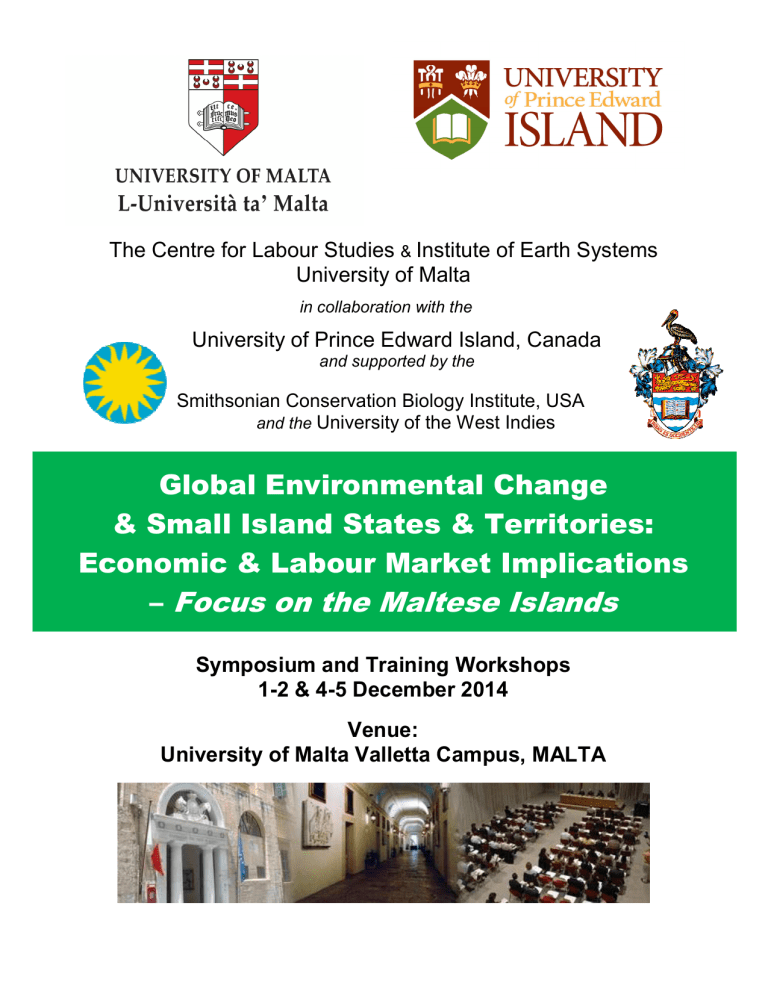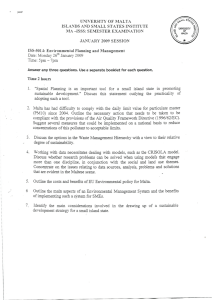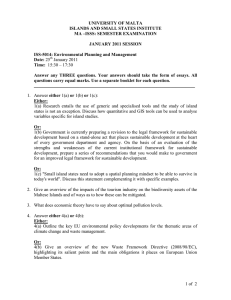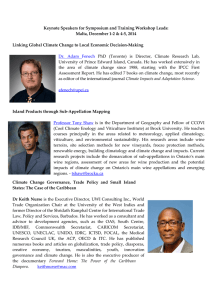Document 13374076

PROGRAMME
Monday, 1 December
Opening Day of 2 ‐ Day Symposium:
08.30 Registration
09.00 Opening Session: Chaired by Prof. Godfrey Baldacchino & Dr Charles Galdies
09.05 Dr Anna Borg – Director, Centre for Labour Studies, University of Malta
09.10 Prof. Louis F. Cassar – Director, Institute of Earth Systems, University of Malta
09.15 Dr Robert Gilmour, Vice-President (Research & Graduate Studies), University of Prince Edward
Island, Canada
09.20 Symposium Opening Address: The Hon. Leo Brincat, Minister for Sustainable Development, the
Environment and Climate Change
09.40 Keynote Address: Dr Adam Fenech – Malta and Climate Modelling
10.20 Discussion
10.40 Refreshment Break
11.10 Keynote Address: Prof. Godfrey Baldacchino – Environmental Change and Small Island States and Territories
11.50 Discussion
12.00 Lunch Break
13.40 Global environmental change and agriculture and viticulture in Malta: Mr. Tony Meli
14.10 Discussion
14.20 Global environmental change and tourism in Malta: Prof. Andrew L. Jones
14.50 Discussion
15.00 Refreshment Break
15.15 Additional Symposium Papers (Parallel Presentations)
16.45 Closure of Day 1
Tuesday, 2 December
Second and Final Day of 2 ‐ Day Symposium:
09.00 Registration
09.30 Welcome & Synthesis of Day 1: Dr Robert Gilmour
09.40 Keynote Address: Dr Anthony B. Shaw (Agriculture and Viticulture)
10.20 Discussion
10.40 Refreshment Break
11.00 Keynote Address: Dr Daniel Scott (Tourism)
11.40 Discussion
12.00 Lunch Break
13.40 Global environmental change and land/air/sea transportation in Malta: Prof. Maria Attard
14.20 Discussion
14.40 Global environmental change and fisheries in Malta: Dr Leyla Knittweis
15.20 Discussion
15.40 Refreshment Break
16.00 Keynote Address: Dr Keith Nurse - Climate Change Governance, Trade Policy and Small Island
States: The Case of the Caribbean.
16.40 Discussion
17.00 Conclusion and Wrap-Up
Wednesday, 3 December: FREE DAY
Thursday, 4 December
Opening Half Day of 2 ‐ Day Training Session:
09.15 Registration
09.30 Welcome
09.45 1 st
Parallel Session: Translating environmental change data into economic indicators, relevant to four specific economic sectors: (1) Agriculture & Viticulture; (2) Fisheries; (3) Tourism; (4) Land-Sea-
Air Transportation.
10.30 Refreshment Break
10.45 2 nd
Parallel Session: Translating environmental change data into economic indicators, relevant to four specific economic sectors: (1) Agriculture & Viticulture; (2) Fisheries; (3) Tourism; (4) Land-Sea-
Air Transportation.
12.00 Lunch
Friday, 5 December
Final Half ‐ Day of 2 ‐ Day Training Session:
09.15 Registration
09.30 Welcome
09.45 3 rd
Parallel Session: Translating environmental change data into economic indicators, relevant to four specific economic sectors: (1) Agriculture & Viticulture; (2) Fisheries; (3) Tourism; (4) Land-Sea-
Air Transportation.
10.30 Refreshment Break
10.45 4 th
Parallel Session: Translating environmental change data into economic indicators, relevant to four specific economic sectors: (1) Agriculture & Viticulture; (2) Fisheries; (3) Tourism; (4) Land-Sea-
Air Transportation.
12.00 Lunch and Departure of International Delegates
CONTEXT
Rising sea levels threaten coastal communities and trigger wholesale evacuations. Changing atmospheric conditions reduce rainfall and exacerbate flash floods. Ocean acidification leads to the collapse of fish stocks. Salt water intrusions prejudice water supplies and jeopardise crops.
Most predictions of environmental change portend a significant impact on island environments throughout the world, including the extinction of endemic species, the wholesale depopulation of island communities, as well as the thorough ‘drowning’ of some island states.
Already susceptible to environmental impacts, and with fragile economic systems, small island states and territories are likely to experience large-scale shifts in their economies and their labour markets as a result of the impact of global environmental change.
Do we know what is in store? And how does our economy prepare itself?
This event will bring to bear leading-edge environmental science for its specific application to the economic and labour market predicament of Malta, looked at from the vantage point
of a small island state.
This event should be of interest to trade union and community leaders, senior public servants, environmental scientists, economists, businesspersons, investors, educators, scholars, demographers and planners working on, for or with, island states and territories, and who are keen to develop knowledge and hone skills to translate island-relevant environmental science and data into sound economic and labour market policy, and particularly in/for the Maltese Islands.
REGISTRATION
The early bird fee (up to 15 October 2014): €150. Late fee: €175. Fee covers conference materials, coffee breaks, light lunches, WiFi access, welcome reception.
Instead of registering for the whole conference, participants may register for individual events:
Symposium only (1 & 2 December): Early registration fee: €90. Late fee: €105. Fee covers
WiFi access, reception on Monday evening, 2 light lunches, coffee breaks, conference pack.
Training Sessions only (4 & 5 December): Early registration fee: €80. Late fee: €95. Fee covers WiFi access, 2 light lunches, coffee breaks, conference pack.
Online booking: http://www.um.edu.mt/events/globalenvchange2014/registration/form
For queries regarding the conference arrangements contact:
Lucienne M. Bugeja
Logistics & Events Coordination
University of Malta Valletta Campus
Old University Building, St Paul’s Street
Valletta VLT 1216, MALTA
Tel: +356 2340 7511
Email: lucienne.m.bugeja@um.edu.mt




